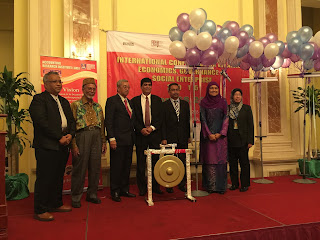This is an interesting excerpt from University World News titled A ‘whole-of-university’ approach: Role of Universities to fight corruption
It is important to highlight that, at university level, curricula typically lack components that would contribute to a non-tolerance of such conduct. There are good reasons for higher education to take on these challenges.
- First, on a global level, corruption is considered one of the major obstacles for meaningful democracy, economic wealth and human well-being.
- Second, apart from direct costs, both petty and grand corruption erodes social trust and contributes to reinforcing dysfunctional norms in a society. As social trust is needed in most undertakings of collective action, this can in turn undermine the ability of states to collect taxes.
- Third, societies governed by corrupt systems and unethical norms provide a breeding ground for economic crisis. Whatever the underlying causes of economic and financial crisis, many governments react by introducing austerity measures.

The combination of crisis and austerity is likely to amplify unemployment, poverty and inequality, which in turn – directly or indirectly – may lead to increased morbidity, mortality and human suffering. Adding to that, austerity measures often strike particularly hard against those unconnected with the causes of the crisis, which may further lead to an erosion of both trust and legitimacy in our democratic institutions.
From the numerous interactions from which we infer our trust in others, it is clear that reaching out only to students of law and public policy will fail to have the desired effects. To name but a few: your banker is likely to be an economist; engineers are often central in public procurement; doctors, nurses and administrators alike are all points of contact in the health sector.
Thus, for universities to optimise their roles as drivers of change towards social capital, health and well-being, a ‘whole-of-university’ promotion is needed. Recognising the university sector’s potential, as well as its responsibility to help shape the moral contours of society for the better, we ask institutions of higher education to:
Endorse a cross-faculty approach to include components of ethics and anti-corruption in curricula.
- Teach teachers to encourage and facilitate the incorporation of ethics issues within their classes.
- Appreciate the opportunity to shape professional identities, which set the boundaries of future acceptable behaviour.
- 'Talk the talk' and 'walk the walk' – that is, in addition to educating on ethical behaviour it is crucial that universities – as agents providing a public good – themselves act accordingly, ensuring impartiality in teaching, student assessment and research and that matters regarding awards of degrees, employment and promotions are based on transparent and objective criteria.
Through this initiative, higher education can play its part in the global fight against corruption.
http://www.universityworldnews.com/article.php?story=20141113110707222
 The Malaysian Anti-Corruption Commission (MACC) is a government agency in Malaysia that investigates and prosecutes corruption in the public and private sectors. The agency was originally modeled after top anti-corruption agencies, such as the Independent Commission Against Corruption (ICAC) of Hong Kong and New South Wales, Australia. Since its establishment in 2009, the MACC has been steadily discharging its duties and responsibilities as the primary agency tasked with weeding out corruption in Malaysia. In order to ensure MACC’s independence, transparency and professionalism, five separate and independent oversight bodies were formed to monitor the functions of the MACC an act as a check-and-balance. Members of these panels represent the general public and include senior former government officials, politicians (both from the government and the opposition), professionals, academicians, lawyers and individuals of high standing in society.
The Malaysian Anti-Corruption Commission (MACC) is a government agency in Malaysia that investigates and prosecutes corruption in the public and private sectors. The agency was originally modeled after top anti-corruption agencies, such as the Independent Commission Against Corruption (ICAC) of Hong Kong and New South Wales, Australia. Since its establishment in 2009, the MACC has been steadily discharging its duties and responsibilities as the primary agency tasked with weeding out corruption in Malaysia. In order to ensure MACC’s independence, transparency and professionalism, five separate and independent oversight bodies were formed to monitor the functions of the MACC an act as a check-and-balance. Members of these panels represent the general public and include senior former government officials, politicians (both from the government and the opposition), professionals, academicians, lawyers and individuals of high standing in society. There are currently five independent bodies that monitor the MACC to ensure its integrity and to protect citizens’ rights. The five bodies are namely: the Anti-Corruption Advisory Board, the Special Committee on Corruption, the Complaints Committee, the Operations Review Panel, and the Corruption Consultation and Prevention Panel. The existence of these independent oversight committees is a reflection of the MACC’s impartiality and independence, compared with the ACA. The Accounting Research Institute (ARI) is greatly honoured that two of its research fellows/ associates are in these independent oversight bodies. Professor Dr Normah Omar is member of the Operation Review Panel and Professor Dr Syed Noh Syed Ahmad is member of Corruption Consultation Panel.
There are currently five independent bodies that monitor the MACC to ensure its integrity and to protect citizens’ rights. The five bodies are namely: the Anti-Corruption Advisory Board, the Special Committee on Corruption, the Complaints Committee, the Operations Review Panel, and the Corruption Consultation and Prevention Panel. The existence of these independent oversight committees is a reflection of the MACC’s impartiality and independence, compared with the ACA. The Accounting Research Institute (ARI) is greatly honoured that two of its research fellows/ associates are in these independent oversight bodies. Professor Dr Normah Omar is member of the Operation Review Panel and Professor Dr Syed Noh Syed Ahmad is member of Corruption Consultation Panel. 














